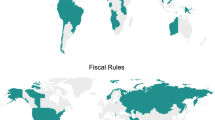Abstract
Natural resources and aid give dictators revenue to maintain power. Attempts are being made, therefore, to funnel these resources away from nondemocratic governments and toward their citizens. Using formal analysis and building on existing theories of democratization, I analyze the effects of such institutional solutions when they function perfectly (the best-case scenario). The models show that even with institutional safeguards, these resources diminish chances for democratization. In addition to their practical importance, the results have an important theoretical implication: the political resource curse may not be due to dictators' use of these resources, but simply to their existence in nondemocracies.
Similar content being viewed by others
References
Acemoglu, D., & Robinson, J.A. (2001). A theory of political transitions. American Economic Review, 91, 938–963.
Acemoglu, D., & Robinson, J.A. (2006). Economic origins of dictatorship and democracy. New York: Cambridge University Press.
Alesina, A., Ardagna, S., Perotti, R., & Schiantarelli, F. (2002). Fiscal policy, profits, and investment. American Economic Review, 92, 571–589.
Alesina, A., & Dollar, D.R. (2000). Who gives foreign aid to whom and why? Journal of Economic Growth, 5, 33–64.
Azam, J.-P. (1995). How to pay for the peace? A theoretical framework with references to African countries. Public Choice, 83, 173–184.
Azam, J.-P. (2001). The redistributive state and conflicts in Africa. Journal of Peace Research, 38, 429–444.
Birdsall, N., & Subramanian, A. (2004). Saving Iraq from its oil. Foreign Affairs, 83, 77–89.
Boix, C. (2003). Democracy and redistribution. Cambridge: Cambridge University Press.
Bratton, M., & van de Walle, N. (1997). Democratic experiments in Africa: Regime transitions in comparative perspective. Cambridge: Cambridge University Press.
Burnside, C., & Dollar, D.R. (2000). Aid, policies, and growth. American Economic Review, 90, 847–868.
Feyzioglu, T., Swaroop, V., & Zhu, M. (1998). A panel data analysis of the fungibility of foreign aid. World Bank Economic Review, 12, 29–58.
Goldsmith, A.A. (2001). Foreign aid and statehood in Africa. International Organization, 55, 123–148.
Ivanhoe, L.F. (2000). World oil supply — production, reserves, and EOR. Golden, CO: M. King Hubbert Center for Petroleum Supply Studies, Colorado School of Mines.
Jensen, N., & Wantchekon, L. (2004). Resource wealth and political regimes in Africa. Comparative Political Studies, 37, 816–841.
Karl, T.L. (1997). The paradox of plenty: Oil booms and petro-states. Berkeley: University of California Press.
Knack, S. (2004). Does foreign aid promote democracy? International Studies Quarterly, 48, 251–266.
Lancaster, C. (1999). Aid to Africa: So much to do, so little done. Chicago: University of Chicago Press.
Landau, D.L. (1985). Government expenditure and economic growth in the developed countries: 1952–76. Public Choice, 47, 459–477.
LICUS Task Force (2002). World Bank group work in low-income countries under stress: A task force report. Washington, DC: World Bank.
Meltzer, A., & Richard, S. (1981). A rational theory of the size of government. Journal of Political Economy, 89, 914–927.
Moore, B. (1966). Social origins of dictatorship and democracy: Lord and peasant in the making of the modern world. Boston: Beacon.
Moore, M. (1998). Death without taxes: Democracy, state capacity, and aid dependence in the fourth world. In: M. Robinson, & G. White (Eds.), The democratic developmental state: Politics and institutional design (pp. 84–121). Oxford: Oxford University Press.
Moore, M. (2001). Political underdevelopment: What causes ‘bad governance’. Public Management Review, 3, 385–418.
Mosley, P. (1992). A theory of conditionality. In: P. Mosley (Ed.), Development finance and policy reform: Essays in the theory and practice of conditionality in less developed countries (pp. 129–153). New York: St. Martin's Press.
Mosley, P., Harrigan, J., & Toye, J. (1995). Aid and power. London: Routledge.
Przeworski, A. (1991). Democracy and the market: Political and economic reforms in eastern Europe and Latin America. Cambridge: Cambridge University Press.
Przeworski, A. (2005). Democracy as equilibrium. Public Choice, 123, 253–273.
Remmer, K.L. (2004). Does foreign aid promote the expansion of government? American Journal of Political Science, 48, 77–92.
Robinson, J.A., Torvik, R., & Verdier, T. (2003). Political foundations of the resource curse, DELTA Working Paper No. 2003–33. Paris: Départment et Laboratoire dÉconomie Théorique et Appliquée.
Ross, M.L. (1999). The political economy of the resource curse. World Politics, 51, 297–322.
Ross, M.L. (2001). Does oil hinder democracy? World Politics, 53, 325–361.
Rueschemeyer, D., Stephens, E.H., & Stephens, J.D. (1992). Capitalist development and democracy. Chicago: University of Chicago Press.
Smith, B. (2004). Oil wealth and regime survival in the developing world, 1960–1999. American Journal of Political Science, 48, 232–246.
Svensson, J. (2000). When is foreign aid policy credible? Aid dependence and conditionality. Journal of Development Economics, 61, 61–84.
Svensson, J. (2003). Why conditional aid does not work and what can be done about it? Journal of Development Economics, 70, 381–402.
Tullock, G. (1971). The paradox of revolution. Public Choice, 11, 89–99.
van de Walle, N. (2001). African economies and the politics of permanent crisis, 1979–1999. New York: Cambridge University Press.
World Bank (1992). Effective implementation: Key to development impact — report of portfolio management task force. Washington, DC: World Bank.
Author information
Authors and Affiliations
Corresponding author
Rights and permissions
About this article
Cite this article
Morrison, K.M. Natural resources, aid, and democratization: A best-case scenario. Public Choice 131, 365–386 (2007). https://doi.org/10.1007/s11127-006-9121-1
Received:
Accepted:
Published:
Issue Date:
DOI: https://doi.org/10.1007/s11127-006-9121-1




